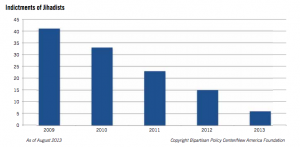Military Commissions (in US!) for Non-Afghan Prisoners Held at Parwan? Brilliant!
When it comes to building policy around Afghanistan, the Obama administration is an endless fount of ideas with colossally ugly optics mixed with untenable legal positions. The latest brilliant offering from them is a beauty:
The Obama administration is actively considering the use of a military commission in the United States to try a Russian who was captured fighting with the Taliban several years ago and has been held by the U.S. military at a detention facility near Bagram air base in Afghanistan, former and current U.S. officials said.
Wait. He was “fighting with the Taliban”? Doesn’t that make him a standard combatant and traditional prisoner of war? Here is more of what the Post has on his history:
The Russian is a veteran of the Soviet war in Afghanistan in the 1980s who deserted and ended up fighting U.S. forces after the Sept. 11, 2001, attacks. U.S. officials said the man, thought to be in his mid- to late 50s, is suspected of involvement in several 2009 attacks in which U.S. troops were wounded or killed. He was wounded during an assault on an Afghan border post that year and later captured.
Little else is known about him except for his nom de guerre, Irek Hamidullan.
No. Still nothing in this description that distinguishes Hamidullan from any other non-Afghan teaming up with the Taliban to take on US forces there. And yet, the military seems to think that their “case” against Hamidullan is among the strongest against the 53 non-Afghan prisoners the US admits to housing at Parwan:
Military prosecutors have examined the evidence against Hamidullan and consider the case among the strongest that could be brought against any of the foreigners held at the Parwan Detention Facility near Bagram.
“He’s pretty well-connected in the terrorist world,” said one official with firsthand knowledge of the case. Hamidullan is thought to have links to one or more insurgent groups and ties to Chechnya, a part of the Russian Federation where rebels have fought two unsuccessful wars for independence.
Officials said Hamidullan remains committed to violent jihad and has sworn that he will return to the battlefield if he is released from prison. U.S. officials said that they have discussed the case with Moscow but that the Russians displayed little or no interest in his return. The senior official said transfers “are not always just up to us. Other countries have a say. Detainees have a say” in cases in which there are concerns about inhumane treatment.
How in the world does one become a fitting subject for a special military commission as an illegal combatant even while pledging to “return to the battlefield”? Read more →

